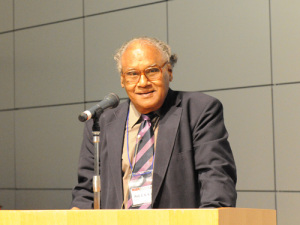Does it help to diversify our education processes?
More regimentation of learning doesn’t help. Many creative processes are lost in any such regimentation.
 Instead of bureaucratic controls, decentralization, why even a degree of de-schooling could enrich the schooling process. Indian education history is long and very unique.
Instead of bureaucratic controls, decentralization, why even a degree of de-schooling could enrich the schooling process. Indian education history is long and very unique.
The old Sanskrit education, the pathashalas and much else had given the Indian education and even the philosophical tradition, a very strong unique Indian air and historic context. Our attempts to revive the Nalanda and other ancient education spirit have to be seen in this context only. The point we want to highlight here is rather modest.
The Bangalore-based Prof.C.N.R.Rao Foundation is reported to have undertaken teaching sciences to the school teachers. That seemed very unique and also triggered some related thoughts. We have in India many other unique institutions like the Bangalore based Indian Institute of Science and also some other institutes promoted recently in the sciences and technologies.
Rather very appropriately, we have the new Azim Premji Foundation, also a university that is doing much good voluntary services in education. In a way, Bangalore is a new centre of many new learning institutions and also at the cutting edge of many new companies, the Start-up culture makes Bangalore the very new creative centre from other areas of learning also like literature, arts and much else.
So the thought came to the fact that as things are at present the CBSE, based in Delhi seems to be concentrating too much on one area of education. The secondary education is also a critical area and we have many new secondary education streams. We have many private and public-funded schools, from Navodaya, Sainik and Kendriya schools, besides some other states-funded residential and day secondary schools.
Aslo, the secondary education sector is changing fast. There are any number of fancy schools here, charging heavy fees and calling themselves International Schools!
When does a school become really an international school? Not when you don’t have foreign students? Not when you don’t follow any radical school syllabus like the ones we see here and there, as in the Nilgiris where you have the Blue Mountain School or some other experimental schools. There are many in Europe and we ourselves have visited many such in France, Switzerland and also in UK. There is a long history of school education experiments.
Now, the point here is the thought why allow only the CBSE to decide everything for the Indian schools from the North to the South. The CBSE, it seems, is doing too many things, from collecting data base, entering all data in a computer to suggesting new exams like a terminal exam at the end of the 10th standard etc.
Do we need to let the CBSE to do so many things for such a large and diverse country like India? We like to invite a debate on this uniform system of secondary education that is also fast becoming highly commercialized. In fact, many CBSE schools have become money-minting machines. We know in some states, high corruption prevails, in granting NOC certificates and the going rates of bribes are unbelievable.
Time for reform is urgent; some autonomous bodies on a regional basis can improve matters. As of now various inequities and inequalities in access to fees and social justice etc are making CBSE ineffective.
Our few suggestions pertain to why not allow such independent practices like CNR Rao Foundation teaching sciences to schools have some formal approval (from society and parents)to benefit others, other schools too in the region? Why not institutions like IISC also engage itself in education experiments like teaching the history of sciences etc.
The possibilities for enriching the learning experiences are immense.
How many know in India that how the sciences grew in history? In 700 BC while translating Greek, natural philosophers in Latin, Bede the Ecclesiastical establishes a method for calculating the date of Easter. He also investigates Earth’s spherical shape, the Moon’ governance of tides and the shortcomings of the Julian calendar!
So also, how the sciences grew in Britian, how the universities of Oxford came into being once the Louis VI drove out the ‘foreigners’!
Such stories of the histories of sciences could be taught by various science labs, as the Prime Minister himself has said in the latest Indian Science Congress. Anyway here are the suggestions for others to think and act upon!